Leadership and Management: Theories, Practices, and Personal Views
VerifiedAdded on 2020/12/09
|11
|3643
|99
Essay
AI Summary
This essay provides a detailed exploration of leadership and management principles. It begins by examining various leadership theories, including the Great Man Theory, Situational Theory, Transformational Theory, and Leader-Member Exchange Theory. The essay then delves into leadership development, outlining key measures for improving leadership skills, such as developing situational awareness, inspiring others, and continuous learning. Furthermore, it distinguishes between leadership and management, highlighting their differences in terms of meaning, basis, focus, power, strategic nature, formulation, perspective, and risk. The essay also incorporates personal reflections on leadership, drawing on the author's experiences and observations. Overall, the essay offers a comprehensive overview of leadership and management, providing valuable insights into their theories, practices, and distinctions.
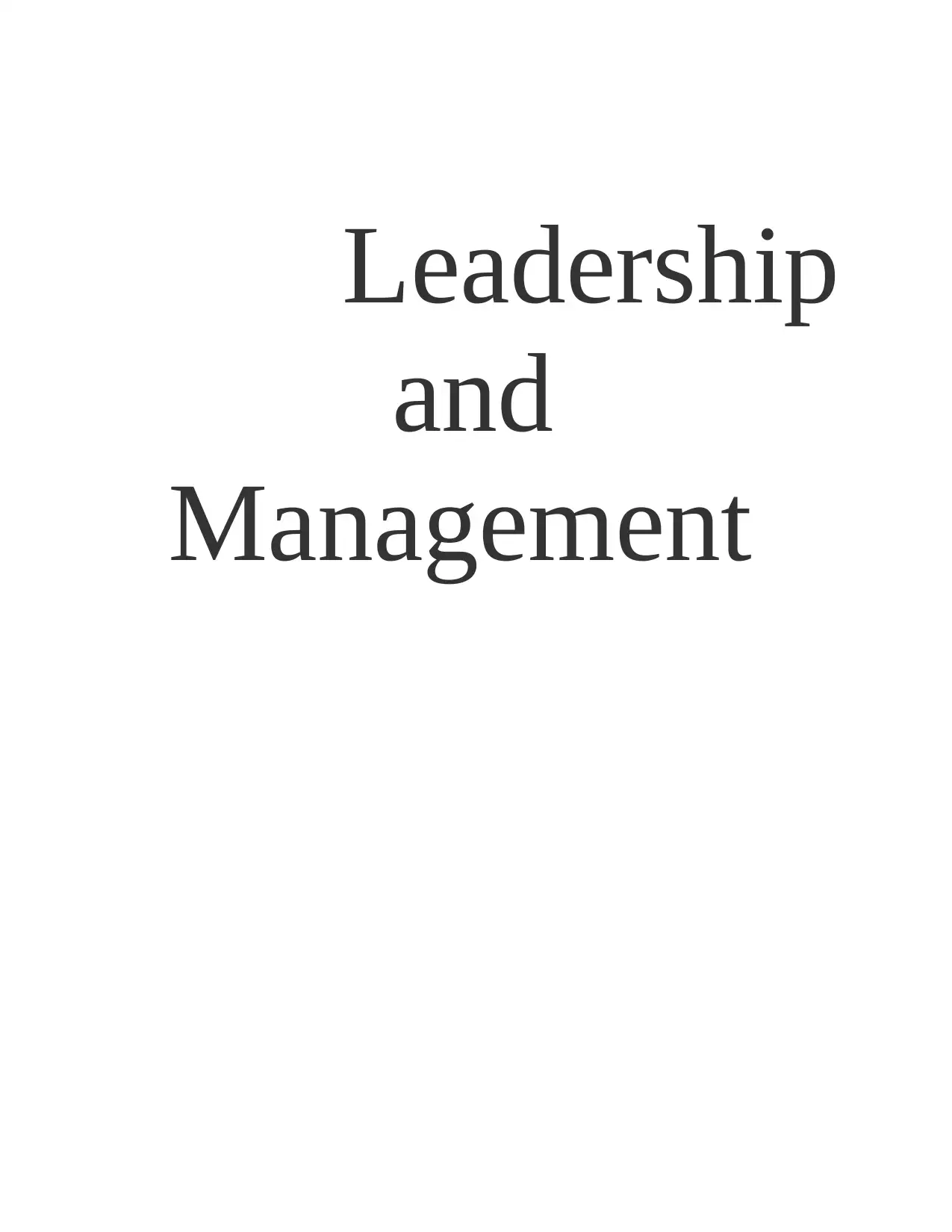
Leadership
and
Management
and
Management
Paraphrase This Document
Need a fresh take? Get an instant paraphrase of this document with our AI Paraphraser
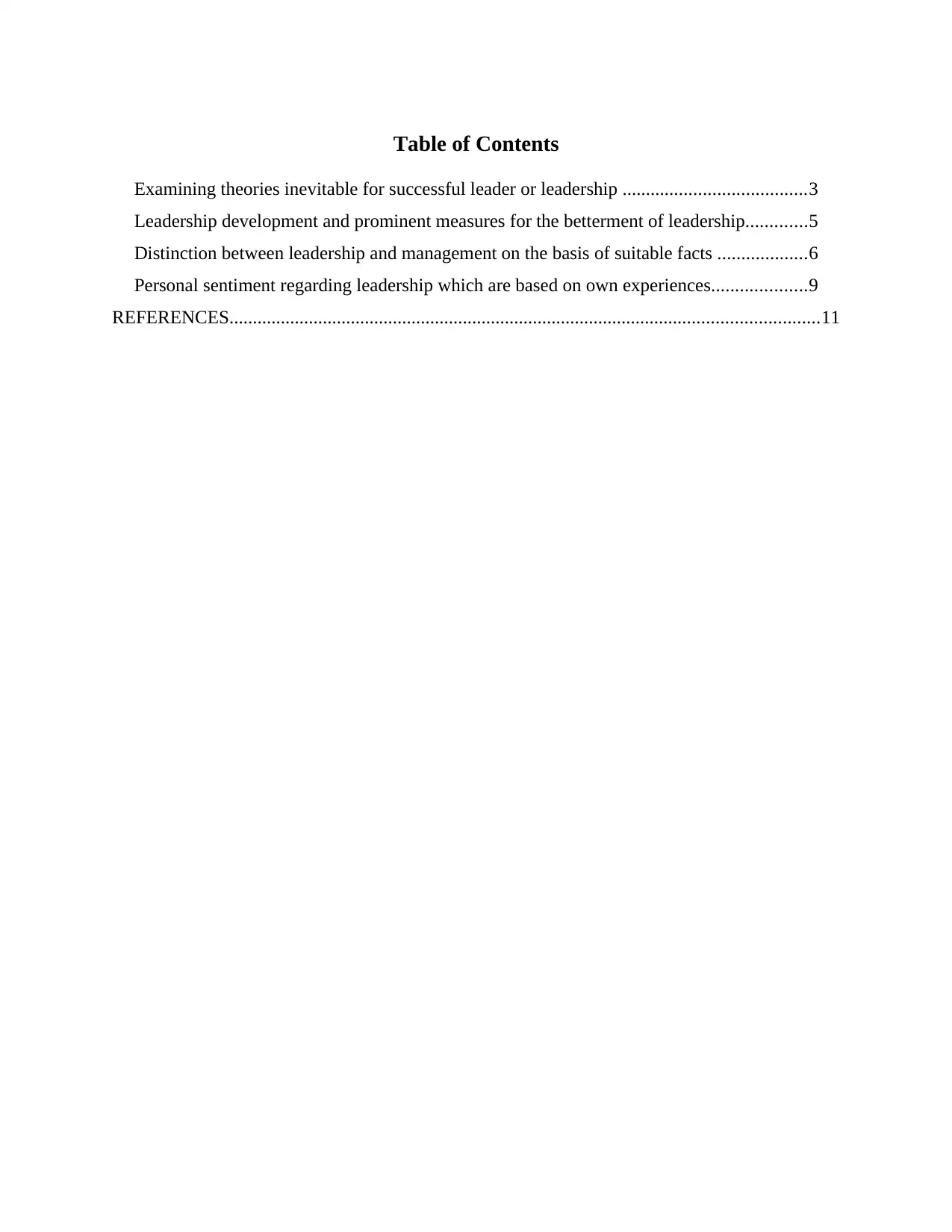
Table of Contents
Examining theories inevitable for successful leader or leadership .......................................3
Leadership development and prominent measures for the betterment of leadership.............5
Distinction between leadership and management on the basis of suitable facts ...................6
Personal sentiment regarding leadership which are based on own experiences....................9
REFERENCES..............................................................................................................................11
Examining theories inevitable for successful leader or leadership .......................................3
Leadership development and prominent measures for the betterment of leadership.............5
Distinction between leadership and management on the basis of suitable facts ...................6
Personal sentiment regarding leadership which are based on own experiences....................9
REFERENCES..............................................................................................................................11
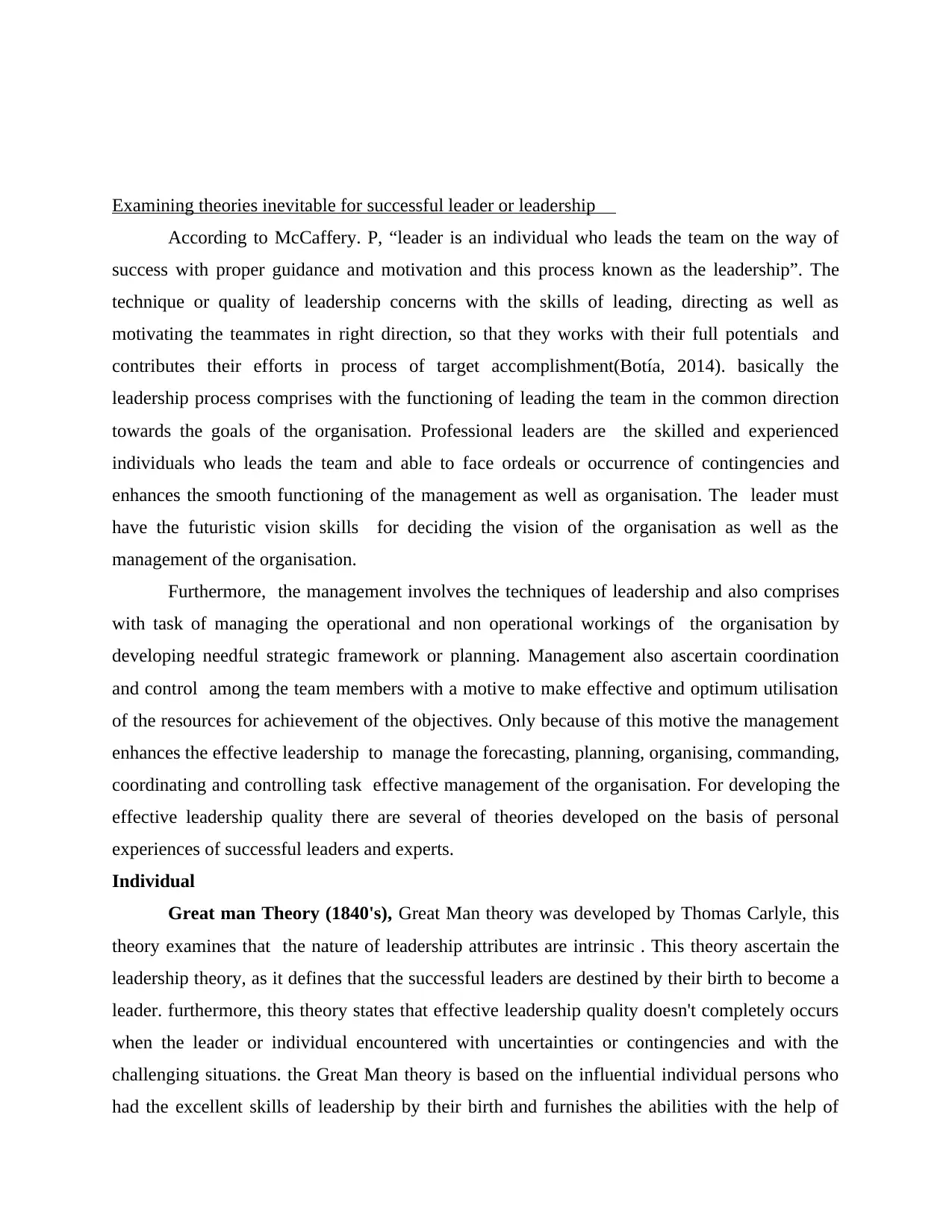
Examining theories inevitable for successful leader or leadership
According to McCaffery. P, “leader is an individual who leads the team on the way of
success with proper guidance and motivation and this process known as the leadership”. The
technique or quality of leadership concerns with the skills of leading, directing as well as
motivating the teammates in right direction, so that they works with their full potentials and
contributes their efforts in process of target accomplishment(Botía, 2014). basically the
leadership process comprises with the functioning of leading the team in the common direction
towards the goals of the organisation. Professional leaders are the skilled and experienced
individuals who leads the team and able to face ordeals or occurrence of contingencies and
enhances the smooth functioning of the management as well as organisation. The leader must
have the futuristic vision skills for deciding the vision of the organisation as well as the
management of the organisation.
Furthermore, the management involves the techniques of leadership and also comprises
with task of managing the operational and non operational workings of the organisation by
developing needful strategic framework or planning. Management also ascertain coordination
and control among the team members with a motive to make effective and optimum utilisation
of the resources for achievement of the objectives. Only because of this motive the management
enhances the effective leadership to manage the forecasting, planning, organising, commanding,
coordinating and controlling task effective management of the organisation. For developing the
effective leadership quality there are several of theories developed on the basis of personal
experiences of successful leaders and experts.
Individual
Great man Theory (1840's), Great Man theory was developed by Thomas Carlyle, this
theory examines that the nature of leadership attributes are intrinsic . This theory ascertain the
leadership theory, as it defines that the successful leaders are destined by their birth to become a
leader. furthermore, this theory states that effective leadership quality doesn't completely occurs
when the leader or individual encountered with uncertainties or contingencies and with the
challenging situations. the Great Man theory is based on the influential individual persons who
had the excellent skills of leadership by their birth and furnishes the abilities with the help of
According to McCaffery. P, “leader is an individual who leads the team on the way of
success with proper guidance and motivation and this process known as the leadership”. The
technique or quality of leadership concerns with the skills of leading, directing as well as
motivating the teammates in right direction, so that they works with their full potentials and
contributes their efforts in process of target accomplishment(Botía, 2014). basically the
leadership process comprises with the functioning of leading the team in the common direction
towards the goals of the organisation. Professional leaders are the skilled and experienced
individuals who leads the team and able to face ordeals or occurrence of contingencies and
enhances the smooth functioning of the management as well as organisation. The leader must
have the futuristic vision skills for deciding the vision of the organisation as well as the
management of the organisation.
Furthermore, the management involves the techniques of leadership and also comprises
with task of managing the operational and non operational workings of the organisation by
developing needful strategic framework or planning. Management also ascertain coordination
and control among the team members with a motive to make effective and optimum utilisation
of the resources for achievement of the objectives. Only because of this motive the management
enhances the effective leadership to manage the forecasting, planning, organising, commanding,
coordinating and controlling task effective management of the organisation. For developing the
effective leadership quality there are several of theories developed on the basis of personal
experiences of successful leaders and experts.
Individual
Great man Theory (1840's), Great Man theory was developed by Thomas Carlyle, this
theory examines that the nature of leadership attributes are intrinsic . This theory ascertain the
leadership theory, as it defines that the successful leaders are destined by their birth to become a
leader. furthermore, this theory states that effective leadership quality doesn't completely occurs
when the leader or individual encountered with uncertainties or contingencies and with the
challenging situations. the Great Man theory is based on the influential individual persons who
had the excellent skills of leadership by their birth and furnishes the abilities with the help of
⊘ This is a preview!⊘
Do you want full access?
Subscribe today to unlock all pages.

Trusted by 1+ million students worldwide
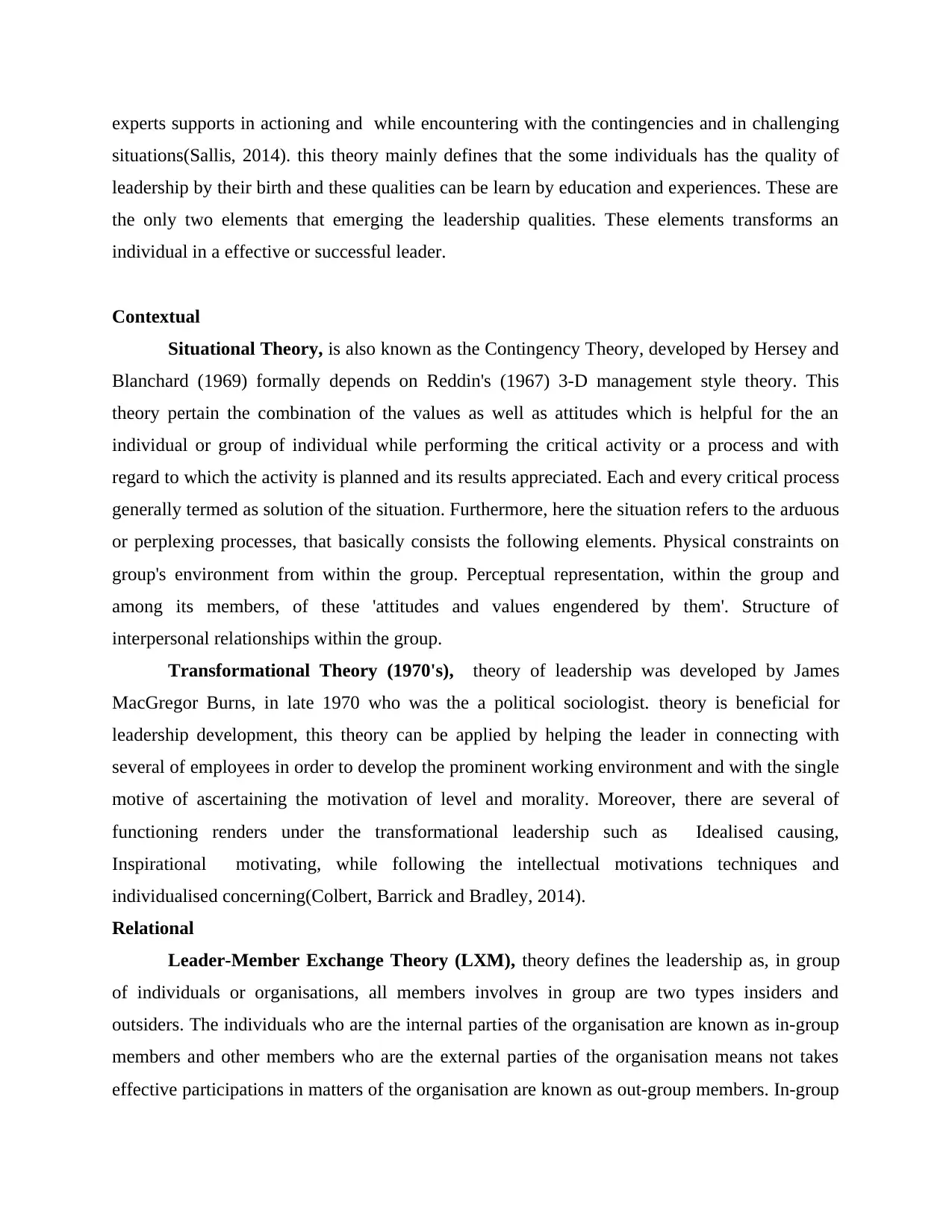
experts supports in actioning and while encountering with the contingencies and in challenging
situations(Sallis, 2014). this theory mainly defines that the some individuals has the quality of
leadership by their birth and these qualities can be learn by education and experiences. These are
the only two elements that emerging the leadership qualities. These elements transforms an
individual in a effective or successful leader.
Contextual
Situational Theory, is also known as the Contingency Theory, developed by Hersey and
Blanchard (1969) formally depends on Reddin's (1967) 3-D management style theory. This
theory pertain the combination of the values as well as attitudes which is helpful for the an
individual or group of individual while performing the critical activity or a process and with
regard to which the activity is planned and its results appreciated. Each and every critical process
generally termed as solution of the situation. Furthermore, here the situation refers to the arduous
or perplexing processes, that basically consists the following elements. Physical constraints on
group's environment from within the group. Perceptual representation, within the group and
among its members, of these 'attitudes and values engendered by them'. Structure of
interpersonal relationships within the group.
Transformational Theory (1970's), theory of leadership was developed by James
MacGregor Burns, in late 1970 who was the a political sociologist. theory is beneficial for
leadership development, this theory can be applied by helping the leader in connecting with
several of employees in order to develop the prominent working environment and with the single
motive of ascertaining the motivation of level and morality. Moreover, there are several of
functioning renders under the transformational leadership such as Idealised causing,
Inspirational motivating, while following the intellectual motivations techniques and
individualised concerning(Colbert, Barrick and Bradley, 2014).
Relational
Leader-Member Exchange Theory (LXM), theory defines the leadership as, in group
of individuals or organisations, all members involves in group are two types insiders and
outsiders. The individuals who are the internal parties of the organisation are known as in-group
members and other members who are the external parties of the organisation means not takes
effective participations in matters of the organisation are known as out-group members. In-group
situations(Sallis, 2014). this theory mainly defines that the some individuals has the quality of
leadership by their birth and these qualities can be learn by education and experiences. These are
the only two elements that emerging the leadership qualities. These elements transforms an
individual in a effective or successful leader.
Contextual
Situational Theory, is also known as the Contingency Theory, developed by Hersey and
Blanchard (1969) formally depends on Reddin's (1967) 3-D management style theory. This
theory pertain the combination of the values as well as attitudes which is helpful for the an
individual or group of individual while performing the critical activity or a process and with
regard to which the activity is planned and its results appreciated. Each and every critical process
generally termed as solution of the situation. Furthermore, here the situation refers to the arduous
or perplexing processes, that basically consists the following elements. Physical constraints on
group's environment from within the group. Perceptual representation, within the group and
among its members, of these 'attitudes and values engendered by them'. Structure of
interpersonal relationships within the group.
Transformational Theory (1970's), theory of leadership was developed by James
MacGregor Burns, in late 1970 who was the a political sociologist. theory is beneficial for
leadership development, this theory can be applied by helping the leader in connecting with
several of employees in order to develop the prominent working environment and with the single
motive of ascertaining the motivation of level and morality. Moreover, there are several of
functioning renders under the transformational leadership such as Idealised causing,
Inspirational motivating, while following the intellectual motivations techniques and
individualised concerning(Colbert, Barrick and Bradley, 2014).
Relational
Leader-Member Exchange Theory (LXM), theory defines the leadership as, in group
of individuals or organisations, all members involves in group are two types insiders and
outsiders. The individuals who are the internal parties of the organisation are known as in-group
members and other members who are the external parties of the organisation means not takes
effective participations in matters of the organisation are known as out-group members. In-group
Paraphrase This Document
Need a fresh take? Get an instant paraphrase of this document with our AI Paraphraser
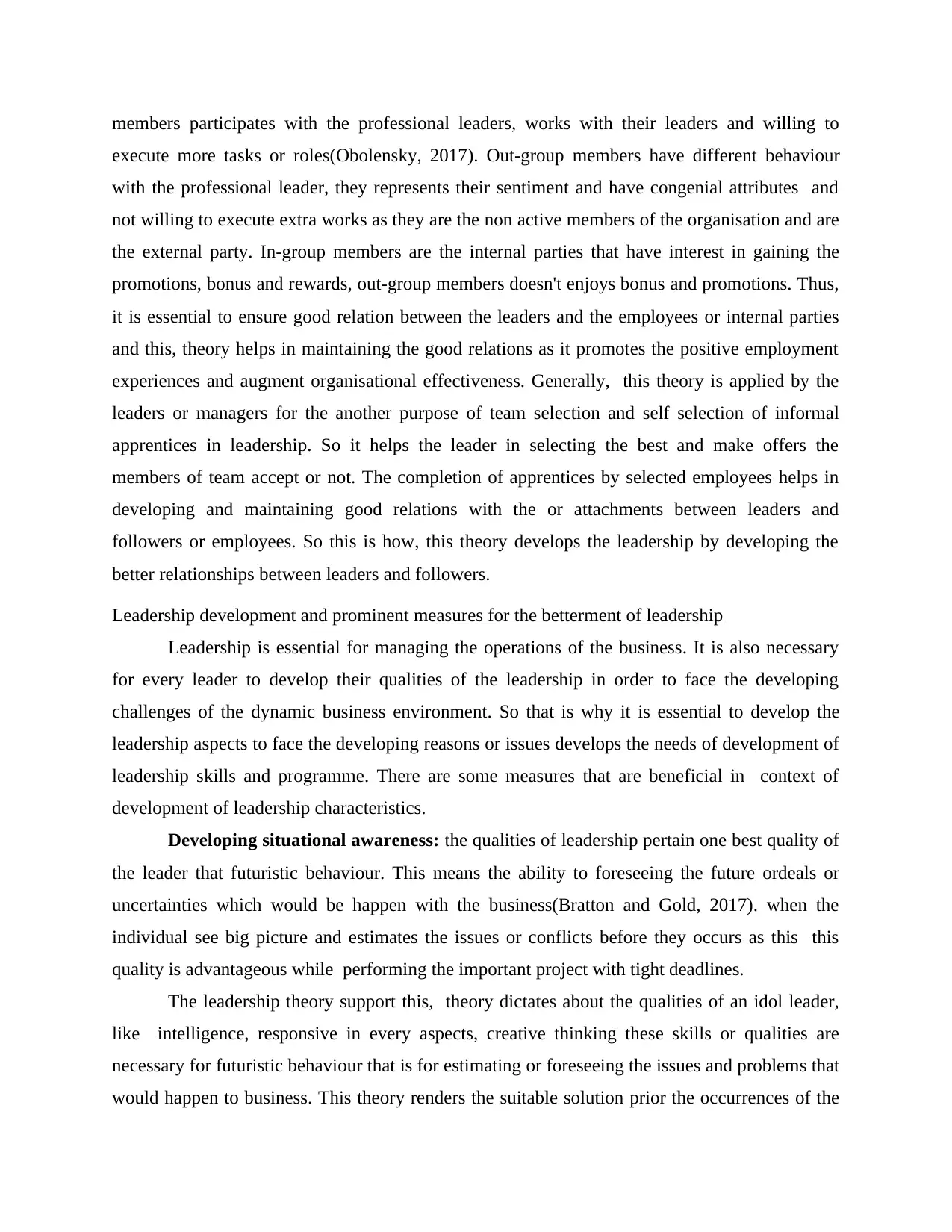
members participates with the professional leaders, works with their leaders and willing to
execute more tasks or roles(Obolensky, 2017). Out-group members have different behaviour
with the professional leader, they represents their sentiment and have congenial attributes and
not willing to execute extra works as they are the non active members of the organisation and are
the external party. In-group members are the internal parties that have interest in gaining the
promotions, bonus and rewards, out-group members doesn't enjoys bonus and promotions. Thus,
it is essential to ensure good relation between the leaders and the employees or internal parties
and this, theory helps in maintaining the good relations as it promotes the positive employment
experiences and augment organisational effectiveness. Generally, this theory is applied by the
leaders or managers for the another purpose of team selection and self selection of informal
apprentices in leadership. So it helps the leader in selecting the best and make offers the
members of team accept or not. The completion of apprentices by selected employees helps in
developing and maintaining good relations with the or attachments between leaders and
followers or employees. So this is how, this theory develops the leadership by developing the
better relationships between leaders and followers.
Leadership development and prominent measures for the betterment of leadership
Leadership is essential for managing the operations of the business. It is also necessary
for every leader to develop their qualities of the leadership in order to face the developing
challenges of the dynamic business environment. So that is why it is essential to develop the
leadership aspects to face the developing reasons or issues develops the needs of development of
leadership skills and programme. There are some measures that are beneficial in context of
development of leadership characteristics.
Developing situational awareness: the qualities of leadership pertain one best quality of
the leader that futuristic behaviour. This means the ability to foreseeing the future ordeals or
uncertainties which would be happen with the business(Bratton and Gold, 2017). when the
individual see big picture and estimates the issues or conflicts before they occurs as this this
quality is advantageous while performing the important project with tight deadlines.
The leadership theory support this, theory dictates about the qualities of an idol leader,
like intelligence, responsive in every aspects, creative thinking these skills or qualities are
necessary for futuristic behaviour that is for estimating or foreseeing the issues and problems that
would happen to business. This theory renders the suitable solution prior the occurrences of the
execute more tasks or roles(Obolensky, 2017). Out-group members have different behaviour
with the professional leader, they represents their sentiment and have congenial attributes and
not willing to execute extra works as they are the non active members of the organisation and are
the external party. In-group members are the internal parties that have interest in gaining the
promotions, bonus and rewards, out-group members doesn't enjoys bonus and promotions. Thus,
it is essential to ensure good relation between the leaders and the employees or internal parties
and this, theory helps in maintaining the good relations as it promotes the positive employment
experiences and augment organisational effectiveness. Generally, this theory is applied by the
leaders or managers for the another purpose of team selection and self selection of informal
apprentices in leadership. So it helps the leader in selecting the best and make offers the
members of team accept or not. The completion of apprentices by selected employees helps in
developing and maintaining good relations with the or attachments between leaders and
followers or employees. So this is how, this theory develops the leadership by developing the
better relationships between leaders and followers.
Leadership development and prominent measures for the betterment of leadership
Leadership is essential for managing the operations of the business. It is also necessary
for every leader to develop their qualities of the leadership in order to face the developing
challenges of the dynamic business environment. So that is why it is essential to develop the
leadership aspects to face the developing reasons or issues develops the needs of development of
leadership skills and programme. There are some measures that are beneficial in context of
development of leadership characteristics.
Developing situational awareness: the qualities of leadership pertain one best quality of
the leader that futuristic behaviour. This means the ability to foreseeing the future ordeals or
uncertainties which would be happen with the business(Bratton and Gold, 2017). when the
individual see big picture and estimates the issues or conflicts before they occurs as this this
quality is advantageous while performing the important project with tight deadlines.
The leadership theory support this, theory dictates about the qualities of an idol leader,
like intelligence, responsive in every aspects, creative thinking these skills or qualities are
necessary for futuristic behaviour that is for estimating or foreseeing the issues and problems that
would happen to business. This theory renders the suitable solution prior the occurrences of the
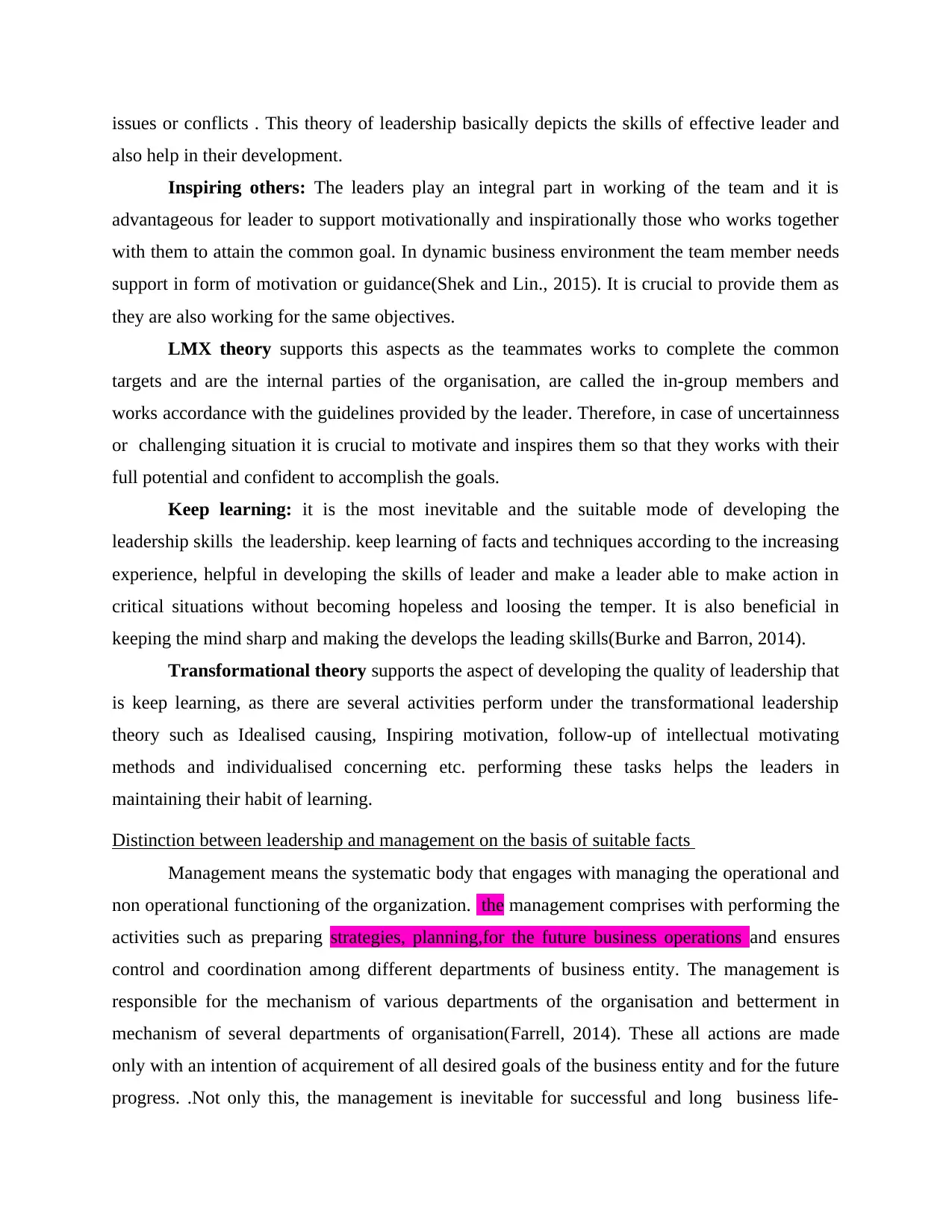
issues or conflicts . This theory of leadership basically depicts the skills of effective leader and
also help in their development.
Inspiring others: The leaders play an integral part in working of the team and it is
advantageous for leader to support motivationally and inspirationally those who works together
with them to attain the common goal. In dynamic business environment the team member needs
support in form of motivation or guidance(Shek and Lin., 2015). It is crucial to provide them as
they are also working for the same objectives.
LMX theory supports this aspects as the teammates works to complete the common
targets and are the internal parties of the organisation, are called the in-group members and
works accordance with the guidelines provided by the leader. Therefore, in case of uncertainness
or challenging situation it is crucial to motivate and inspires them so that they works with their
full potential and confident to accomplish the goals.
Keep learning: it is the most inevitable and the suitable mode of developing the
leadership skills the leadership. keep learning of facts and techniques according to the increasing
experience, helpful in developing the skills of leader and make a leader able to make action in
critical situations without becoming hopeless and loosing the temper. It is also beneficial in
keeping the mind sharp and making the develops the leading skills(Burke and Barron, 2014).
Transformational theory supports the aspect of developing the quality of leadership that
is keep learning, as there are several activities perform under the transformational leadership
theory such as Idealised causing, Inspiring motivation, follow-up of intellectual motivating
methods and individualised concerning etc. performing these tasks helps the leaders in
maintaining their habit of learning.
Distinction between leadership and management on the basis of suitable facts
Management means the systematic body that engages with managing the operational and
non operational functioning of the organization. the management comprises with performing the
activities such as preparing strategies, planning,for the future business operations and ensures
control and coordination among different departments of business entity. The management is
responsible for the mechanism of various departments of the organisation and betterment in
mechanism of several departments of organisation(Farrell, 2014). These all actions are made
only with an intention of acquirement of all desired goals of the business entity and for the future
progress. .Not only this, the management is inevitable for successful and long business life-
also help in their development.
Inspiring others: The leaders play an integral part in working of the team and it is
advantageous for leader to support motivationally and inspirationally those who works together
with them to attain the common goal. In dynamic business environment the team member needs
support in form of motivation or guidance(Shek and Lin., 2015). It is crucial to provide them as
they are also working for the same objectives.
LMX theory supports this aspects as the teammates works to complete the common
targets and are the internal parties of the organisation, are called the in-group members and
works accordance with the guidelines provided by the leader. Therefore, in case of uncertainness
or challenging situation it is crucial to motivate and inspires them so that they works with their
full potential and confident to accomplish the goals.
Keep learning: it is the most inevitable and the suitable mode of developing the
leadership skills the leadership. keep learning of facts and techniques according to the increasing
experience, helpful in developing the skills of leader and make a leader able to make action in
critical situations without becoming hopeless and loosing the temper. It is also beneficial in
keeping the mind sharp and making the develops the leading skills(Burke and Barron, 2014).
Transformational theory supports the aspect of developing the quality of leadership that
is keep learning, as there are several activities perform under the transformational leadership
theory such as Idealised causing, Inspiring motivation, follow-up of intellectual motivating
methods and individualised concerning etc. performing these tasks helps the leaders in
maintaining their habit of learning.
Distinction between leadership and management on the basis of suitable facts
Management means the systematic body that engages with managing the operational and
non operational functioning of the organization. the management comprises with performing the
activities such as preparing strategies, planning,for the future business operations and ensures
control and coordination among different departments of business entity. The management is
responsible for the mechanism of various departments of the organisation and betterment in
mechanism of several departments of organisation(Farrell, 2014). These all actions are made
only with an intention of acquirement of all desired goals of the business entity and for the future
progress. .Not only this, the management is inevitable for successful and long business life-
⊘ This is a preview!⊘
Do you want full access?
Subscribe today to unlock all pages.

Trusted by 1+ million students worldwide
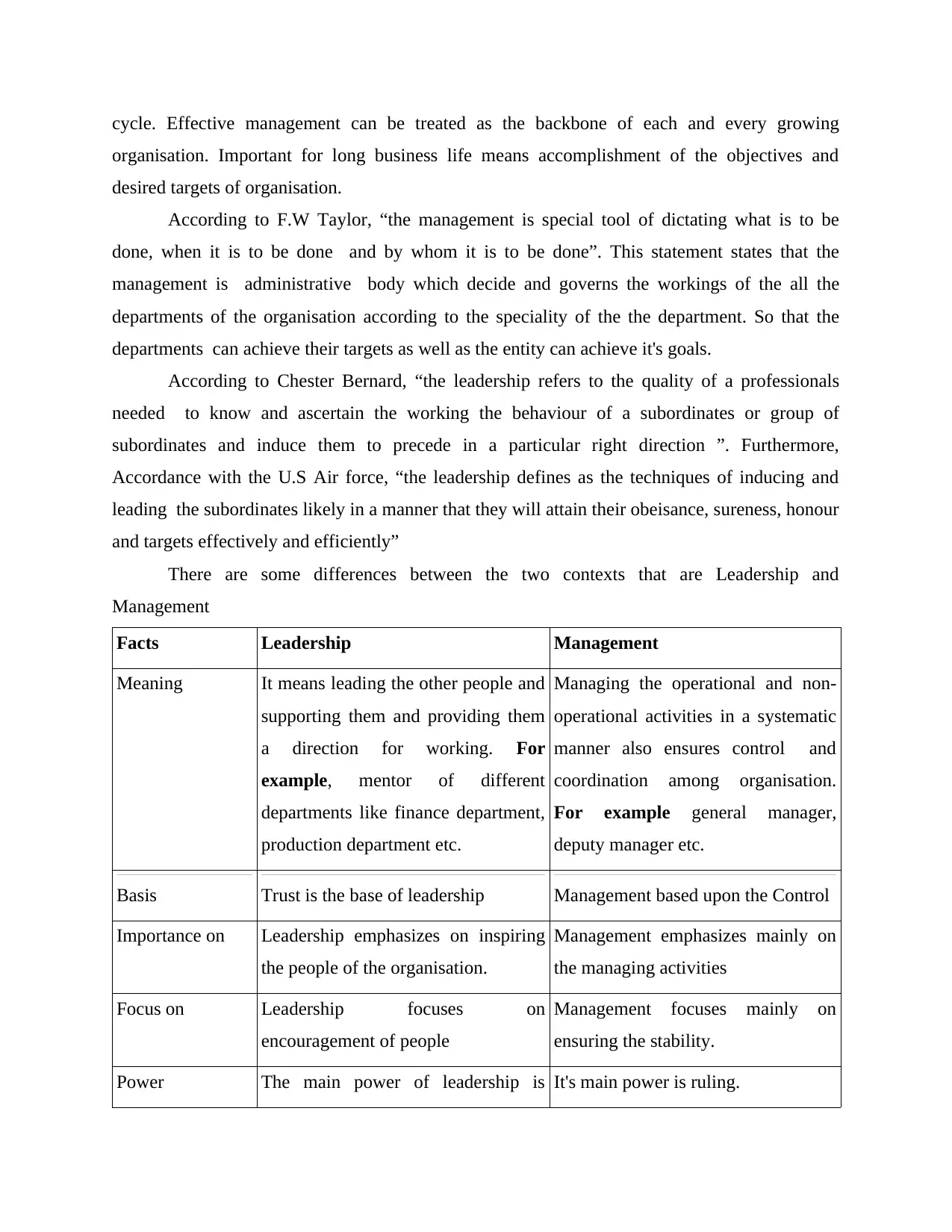
cycle. Effective management can be treated as the backbone of each and every growing
organisation. Important for long business life means accomplishment of the objectives and
desired targets of organisation.
According to F.W Taylor, “the management is special tool of dictating what is to be
done, when it is to be done and by whom it is to be done”. This statement states that the
management is administrative body which decide and governs the workings of the all the
departments of the organisation according to the speciality of the the department. So that the
departments can achieve their targets as well as the entity can achieve it's goals.
According to Chester Bernard, “the leadership refers to the quality of a professionals
needed to know and ascertain the working the behaviour of a subordinates or group of
subordinates and induce them to precede in a particular right direction ”. Furthermore,
Accordance with the U.S Air force, “the leadership defines as the techniques of inducing and
leading the subordinates likely in a manner that they will attain their obeisance, sureness, honour
and targets effectively and efficiently”
There are some differences between the two contexts that are Leadership and
Management
Facts Leadership Management
Meaning It means leading the other people and
supporting them and providing them
a direction for working. For
example, mentor of different
departments like finance department,
production department etc.
Managing the operational and non-
operational activities in a systematic
manner also ensures control and
coordination among organisation.
For example general manager,
deputy manager etc.
Basis Trust is the base of leadership Management based upon the Control
Importance on Leadership emphasizes on inspiring
the people of the organisation.
Management emphasizes mainly on
the managing activities
Focus on Leadership focuses on
encouragement of people
Management focuses mainly on
ensuring the stability.
Power The main power of leadership is It's main power is ruling.
organisation. Important for long business life means accomplishment of the objectives and
desired targets of organisation.
According to F.W Taylor, “the management is special tool of dictating what is to be
done, when it is to be done and by whom it is to be done”. This statement states that the
management is administrative body which decide and governs the workings of the all the
departments of the organisation according to the speciality of the the department. So that the
departments can achieve their targets as well as the entity can achieve it's goals.
According to Chester Bernard, “the leadership refers to the quality of a professionals
needed to know and ascertain the working the behaviour of a subordinates or group of
subordinates and induce them to precede in a particular right direction ”. Furthermore,
Accordance with the U.S Air force, “the leadership defines as the techniques of inducing and
leading the subordinates likely in a manner that they will attain their obeisance, sureness, honour
and targets effectively and efficiently”
There are some differences between the two contexts that are Leadership and
Management
Facts Leadership Management
Meaning It means leading the other people and
supporting them and providing them
a direction for working. For
example, mentor of different
departments like finance department,
production department etc.
Managing the operational and non-
operational activities in a systematic
manner also ensures control and
coordination among organisation.
For example general manager,
deputy manager etc.
Basis Trust is the base of leadership Management based upon the Control
Importance on Leadership emphasizes on inspiring
the people of the organisation.
Management emphasizes mainly on
the managing activities
Focus on Leadership focuses on
encouragement of people
Management focuses mainly on
ensuring the stability.
Power The main power of leadership is It's main power is ruling.
Paraphrase This Document
Need a fresh take? Get an instant paraphrase of this document with our AI Paraphraser
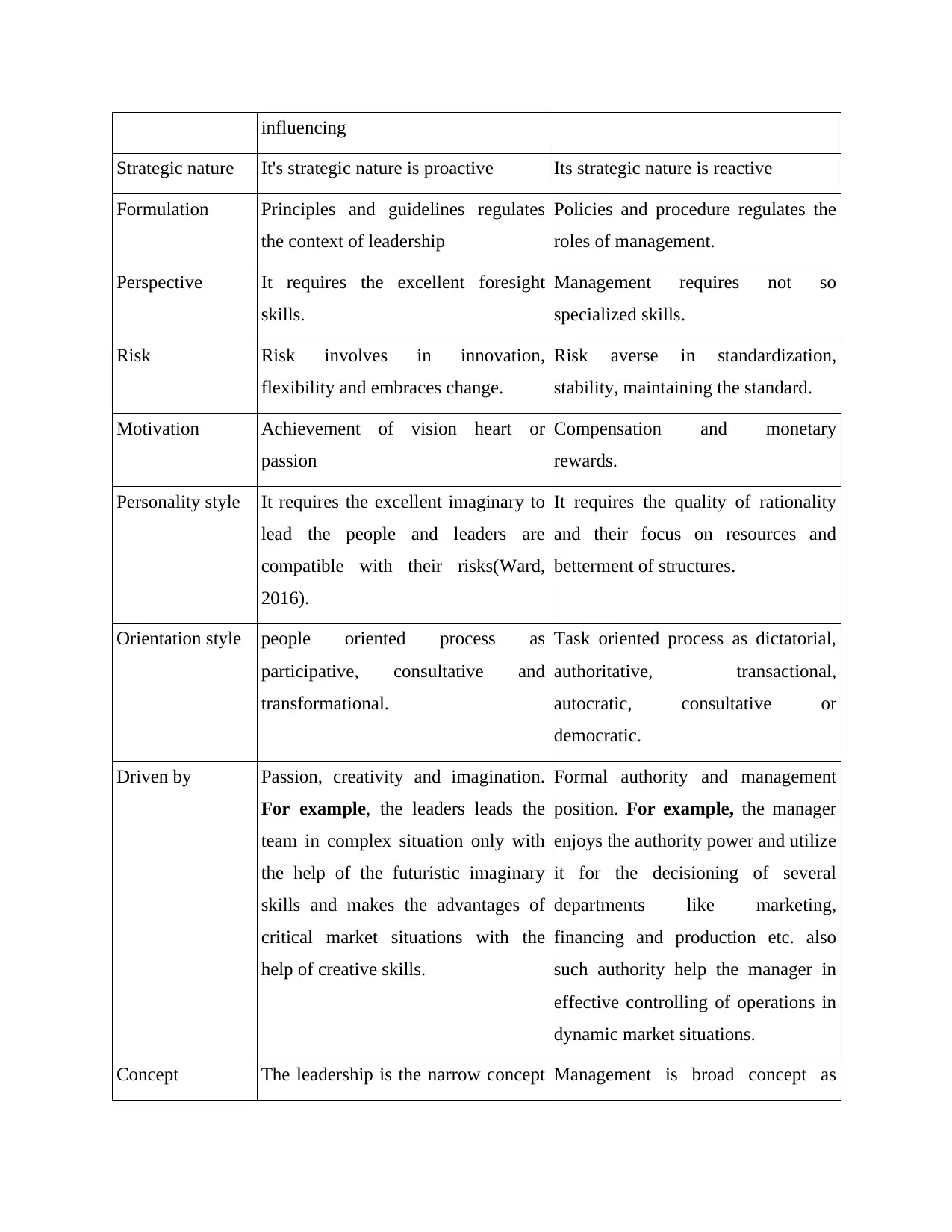
influencing
Strategic nature It's strategic nature is proactive Its strategic nature is reactive
Formulation Principles and guidelines regulates
the context of leadership
Policies and procedure regulates the
roles of management.
Perspective It requires the excellent foresight
skills.
Management requires not so
specialized skills.
Risk Risk involves in innovation,
flexibility and embraces change.
Risk averse in standardization,
stability, maintaining the standard.
Motivation Achievement of vision heart or
passion
Compensation and monetary
rewards.
Personality style It requires the excellent imaginary to
lead the people and leaders are
compatible with their risks(Ward,
2016).
It requires the quality of rationality
and their focus on resources and
betterment of structures.
Orientation style people oriented process as
participative, consultative and
transformational.
Task oriented process as dictatorial,
authoritative, transactional,
autocratic, consultative or
democratic.
Driven by Passion, creativity and imagination.
For example, the leaders leads the
team in complex situation only with
the help of the futuristic imaginary
skills and makes the advantages of
critical market situations with the
help of creative skills.
Formal authority and management
position. For example, the manager
enjoys the authority power and utilize
it for the decisioning of several
departments like marketing,
financing and production etc. also
such authority help the manager in
effective controlling of operations in
dynamic market situations.
Concept The leadership is the narrow concept Management is broad concept as
Strategic nature It's strategic nature is proactive Its strategic nature is reactive
Formulation Principles and guidelines regulates
the context of leadership
Policies and procedure regulates the
roles of management.
Perspective It requires the excellent foresight
skills.
Management requires not so
specialized skills.
Risk Risk involves in innovation,
flexibility and embraces change.
Risk averse in standardization,
stability, maintaining the standard.
Motivation Achievement of vision heart or
passion
Compensation and monetary
rewards.
Personality style It requires the excellent imaginary to
lead the people and leaders are
compatible with their risks(Ward,
2016).
It requires the quality of rationality
and their focus on resources and
betterment of structures.
Orientation style people oriented process as
participative, consultative and
transformational.
Task oriented process as dictatorial,
authoritative, transactional,
autocratic, consultative or
democratic.
Driven by Passion, creativity and imagination.
For example, the leaders leads the
team in complex situation only with
the help of the futuristic imaginary
skills and makes the advantages of
critical market situations with the
help of creative skills.
Formal authority and management
position. For example, the manager
enjoys the authority power and utilize
it for the decisioning of several
departments like marketing,
financing and production etc. also
such authority help the manager in
effective controlling of operations in
dynamic market situations.
Concept The leadership is the narrow concept Management is broad concept as
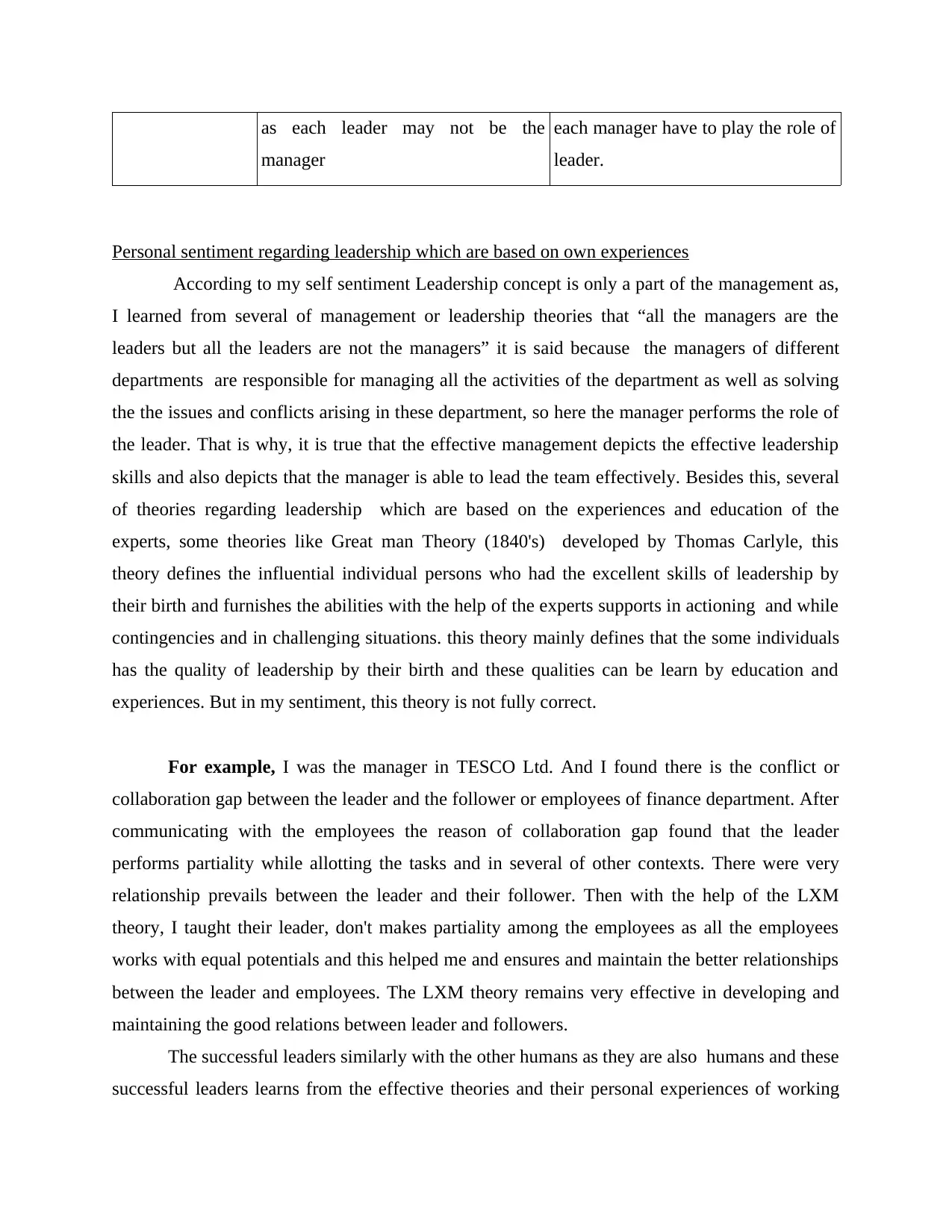
as each leader may not be the
manager
each manager have to play the role of
leader.
Personal sentiment regarding leadership which are based on own experiences
According to my self sentiment Leadership concept is only a part of the management as,
I learned from several of management or leadership theories that “all the managers are the
leaders but all the leaders are not the managers” it is said because the managers of different
departments are responsible for managing all the activities of the department as well as solving
the the issues and conflicts arising in these department, so here the manager performs the role of
the leader. That is why, it is true that the effective management depicts the effective leadership
skills and also depicts that the manager is able to lead the team effectively. Besides this, several
of theories regarding leadership which are based on the experiences and education of the
experts, some theories like Great man Theory (1840's) developed by Thomas Carlyle, this
theory defines the influential individual persons who had the excellent skills of leadership by
their birth and furnishes the abilities with the help of the experts supports in actioning and while
contingencies and in challenging situations. this theory mainly defines that the some individuals
has the quality of leadership by their birth and these qualities can be learn by education and
experiences. But in my sentiment, this theory is not fully correct.
For example, I was the manager in TESCO Ltd. And I found there is the conflict or
collaboration gap between the leader and the follower or employees of finance department. After
communicating with the employees the reason of collaboration gap found that the leader
performs partiality while allotting the tasks and in several of other contexts. There were very
relationship prevails between the leader and their follower. Then with the help of the LXM
theory, I taught their leader, don't makes partiality among the employees as all the employees
works with equal potentials and this helped me and ensures and maintain the better relationships
between the leader and employees. The LXM theory remains very effective in developing and
maintaining the good relations between leader and followers.
The successful leaders similarly with the other humans as they are also humans and these
successful leaders learns from the effective theories and their personal experiences of working
manager
each manager have to play the role of
leader.
Personal sentiment regarding leadership which are based on own experiences
According to my self sentiment Leadership concept is only a part of the management as,
I learned from several of management or leadership theories that “all the managers are the
leaders but all the leaders are not the managers” it is said because the managers of different
departments are responsible for managing all the activities of the department as well as solving
the the issues and conflicts arising in these department, so here the manager performs the role of
the leader. That is why, it is true that the effective management depicts the effective leadership
skills and also depicts that the manager is able to lead the team effectively. Besides this, several
of theories regarding leadership which are based on the experiences and education of the
experts, some theories like Great man Theory (1840's) developed by Thomas Carlyle, this
theory defines the influential individual persons who had the excellent skills of leadership by
their birth and furnishes the abilities with the help of the experts supports in actioning and while
contingencies and in challenging situations. this theory mainly defines that the some individuals
has the quality of leadership by their birth and these qualities can be learn by education and
experiences. But in my sentiment, this theory is not fully correct.
For example, I was the manager in TESCO Ltd. And I found there is the conflict or
collaboration gap between the leader and the follower or employees of finance department. After
communicating with the employees the reason of collaboration gap found that the leader
performs partiality while allotting the tasks and in several of other contexts. There were very
relationship prevails between the leader and their follower. Then with the help of the LXM
theory, I taught their leader, don't makes partiality among the employees as all the employees
works with equal potentials and this helped me and ensures and maintain the better relationships
between the leader and employees. The LXM theory remains very effective in developing and
maintaining the good relations between leader and followers.
The successful leaders similarly with the other humans as they are also humans and these
successful leaders learns from the effective theories and their personal experiences of working
⊘ This is a preview!⊘
Do you want full access?
Subscribe today to unlock all pages.

Trusted by 1+ million students worldwide
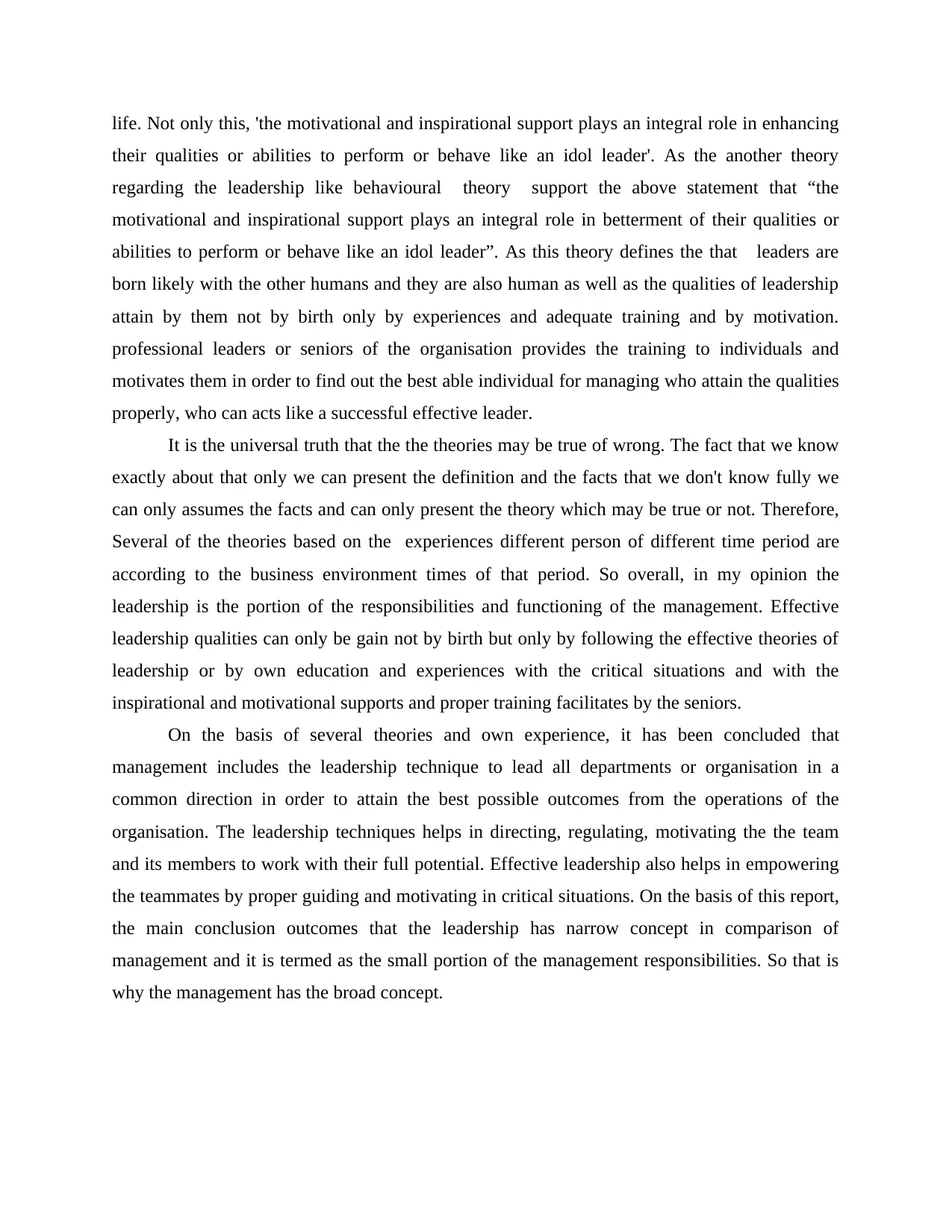
life. Not only this, 'the motivational and inspirational support plays an integral role in enhancing
their qualities or abilities to perform or behave like an idol leader'. As the another theory
regarding the leadership like behavioural theory support the above statement that “the
motivational and inspirational support plays an integral role in betterment of their qualities or
abilities to perform or behave like an idol leader”. As this theory defines the that leaders are
born likely with the other humans and they are also human as well as the qualities of leadership
attain by them not by birth only by experiences and adequate training and by motivation.
professional leaders or seniors of the organisation provides the training to individuals and
motivates them in order to find out the best able individual for managing who attain the qualities
properly, who can acts like a successful effective leader.
It is the universal truth that the the theories may be true of wrong. The fact that we know
exactly about that only we can present the definition and the facts that we don't know fully we
can only assumes the facts and can only present the theory which may be true or not. Therefore,
Several of the theories based on the experiences different person of different time period are
according to the business environment times of that period. So overall, in my opinion the
leadership is the portion of the responsibilities and functioning of the management. Effective
leadership qualities can only be gain not by birth but only by following the effective theories of
leadership or by own education and experiences with the critical situations and with the
inspirational and motivational supports and proper training facilitates by the seniors.
On the basis of several theories and own experience, it has been concluded that
management includes the leadership technique to lead all departments or organisation in a
common direction in order to attain the best possible outcomes from the operations of the
organisation. The leadership techniques helps in directing, regulating, motivating the the team
and its members to work with their full potential. Effective leadership also helps in empowering
the teammates by proper guiding and motivating in critical situations. On the basis of this report,
the main conclusion outcomes that the leadership has narrow concept in comparison of
management and it is termed as the small portion of the management responsibilities. So that is
why the management has the broad concept.
their qualities or abilities to perform or behave like an idol leader'. As the another theory
regarding the leadership like behavioural theory support the above statement that “the
motivational and inspirational support plays an integral role in betterment of their qualities or
abilities to perform or behave like an idol leader”. As this theory defines the that leaders are
born likely with the other humans and they are also human as well as the qualities of leadership
attain by them not by birth only by experiences and adequate training and by motivation.
professional leaders or seniors of the organisation provides the training to individuals and
motivates them in order to find out the best able individual for managing who attain the qualities
properly, who can acts like a successful effective leader.
It is the universal truth that the the theories may be true of wrong. The fact that we know
exactly about that only we can present the definition and the facts that we don't know fully we
can only assumes the facts and can only present the theory which may be true or not. Therefore,
Several of the theories based on the experiences different person of different time period are
according to the business environment times of that period. So overall, in my opinion the
leadership is the portion of the responsibilities and functioning of the management. Effective
leadership qualities can only be gain not by birth but only by following the effective theories of
leadership or by own education and experiences with the critical situations and with the
inspirational and motivational supports and proper training facilitates by the seniors.
On the basis of several theories and own experience, it has been concluded that
management includes the leadership technique to lead all departments or organisation in a
common direction in order to attain the best possible outcomes from the operations of the
organisation. The leadership techniques helps in directing, regulating, motivating the the team
and its members to work with their full potential. Effective leadership also helps in empowering
the teammates by proper guiding and motivating in critical situations. On the basis of this report,
the main conclusion outcomes that the leadership has narrow concept in comparison of
management and it is termed as the small portion of the management responsibilities. So that is
why the management has the broad concept.
Paraphrase This Document
Need a fresh take? Get an instant paraphrase of this document with our AI Paraphraser
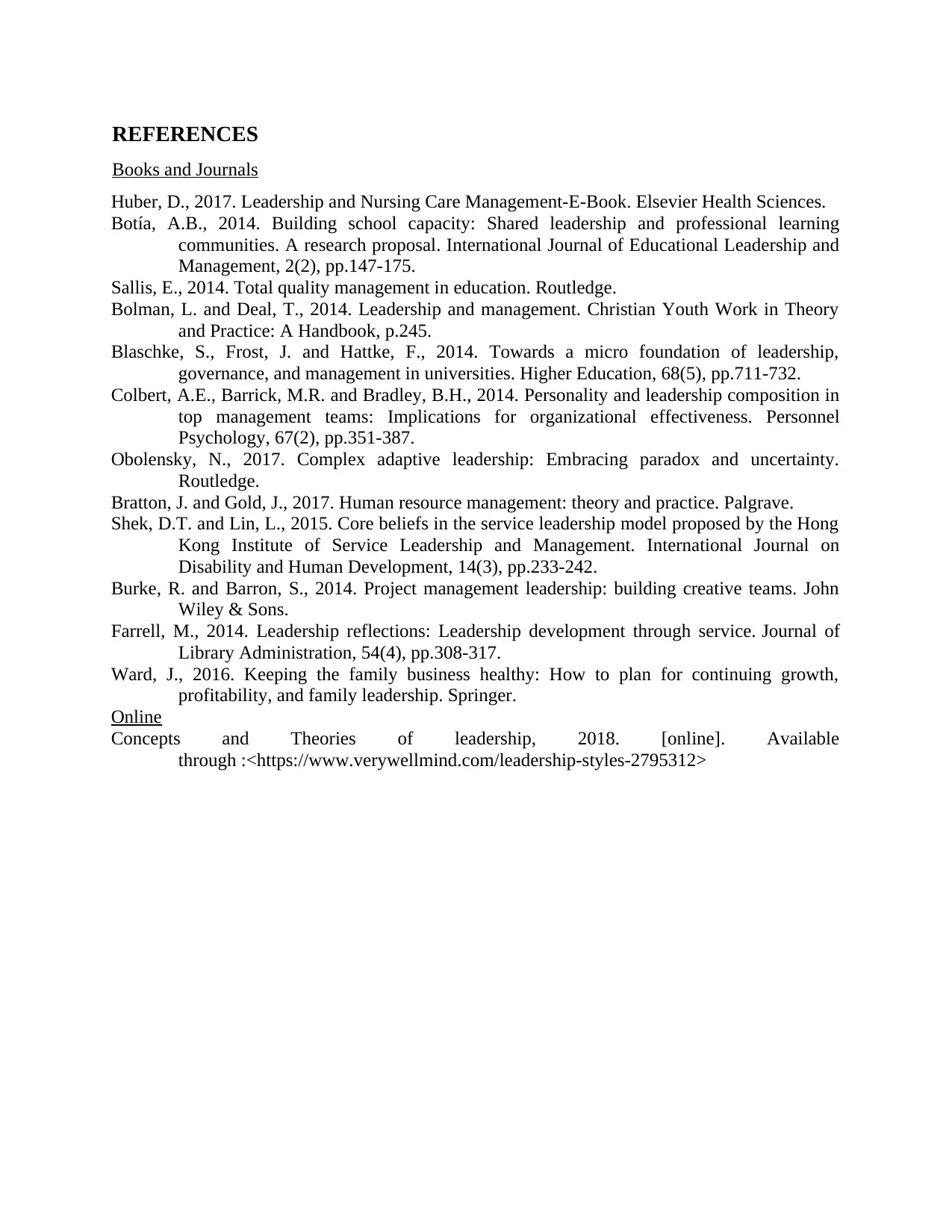
REFERENCES
Books and Journals
Huber, D., 2017. Leadership and Nursing Care Management-E-Book. Elsevier Health Sciences.
Botía, A.B., 2014. Building school capacity: Shared leadership and professional learning
communities. A research proposal. International Journal of Educational Leadership and
Management, 2(2), pp.147-175.
Sallis, E., 2014. Total quality management in education. Routledge.
Bolman, L. and Deal, T., 2014. Leadership and management. Christian Youth Work in Theory
and Practice: A Handbook, p.245.
Blaschke, S., Frost, J. and Hattke, F., 2014. Towards a micro foundation of leadership,
governance, and management in universities. Higher Education, 68(5), pp.711-732.
Colbert, A.E., Barrick, M.R. and Bradley, B.H., 2014. Personality and leadership composition in
top management teams: Implications for organizational effectiveness. Personnel
Psychology, 67(2), pp.351-387.
Obolensky, N., 2017. Complex adaptive leadership: Embracing paradox and uncertainty.
Routledge.
Bratton, J. and Gold, J., 2017. Human resource management: theory and practice. Palgrave.
Shek, D.T. and Lin, L., 2015. Core beliefs in the service leadership model proposed by the Hong
Kong Institute of Service Leadership and Management. International Journal on
Disability and Human Development, 14(3), pp.233-242.
Burke, R. and Barron, S., 2014. Project management leadership: building creative teams. John
Wiley & Sons.
Farrell, M., 2014. Leadership reflections: Leadership development through service. Journal of
Library Administration, 54(4), pp.308-317.
Ward, J., 2016. Keeping the family business healthy: How to plan for continuing growth,
profitability, and family leadership. Springer.
Online
Concepts and Theories of leadership, 2018. [online]. Available
through :<https://www.verywellmind.com/leadership-styles-2795312>
Books and Journals
Huber, D., 2017. Leadership and Nursing Care Management-E-Book. Elsevier Health Sciences.
Botía, A.B., 2014. Building school capacity: Shared leadership and professional learning
communities. A research proposal. International Journal of Educational Leadership and
Management, 2(2), pp.147-175.
Sallis, E., 2014. Total quality management in education. Routledge.
Bolman, L. and Deal, T., 2014. Leadership and management. Christian Youth Work in Theory
and Practice: A Handbook, p.245.
Blaschke, S., Frost, J. and Hattke, F., 2014. Towards a micro foundation of leadership,
governance, and management in universities. Higher Education, 68(5), pp.711-732.
Colbert, A.E., Barrick, M.R. and Bradley, B.H., 2014. Personality and leadership composition in
top management teams: Implications for organizational effectiveness. Personnel
Psychology, 67(2), pp.351-387.
Obolensky, N., 2017. Complex adaptive leadership: Embracing paradox and uncertainty.
Routledge.
Bratton, J. and Gold, J., 2017. Human resource management: theory and practice. Palgrave.
Shek, D.T. and Lin, L., 2015. Core beliefs in the service leadership model proposed by the Hong
Kong Institute of Service Leadership and Management. International Journal on
Disability and Human Development, 14(3), pp.233-242.
Burke, R. and Barron, S., 2014. Project management leadership: building creative teams. John
Wiley & Sons.
Farrell, M., 2014. Leadership reflections: Leadership development through service. Journal of
Library Administration, 54(4), pp.308-317.
Ward, J., 2016. Keeping the family business healthy: How to plan for continuing growth,
profitability, and family leadership. Springer.
Online
Concepts and Theories of leadership, 2018. [online]. Available
through :<https://www.verywellmind.com/leadership-styles-2795312>
1 out of 11
Related Documents
Your All-in-One AI-Powered Toolkit for Academic Success.
+13062052269
info@desklib.com
Available 24*7 on WhatsApp / Email
![[object Object]](/_next/static/media/star-bottom.7253800d.svg)
Unlock your academic potential
Copyright © 2020–2025 A2Z Services. All Rights Reserved. Developed and managed by ZUCOL.




